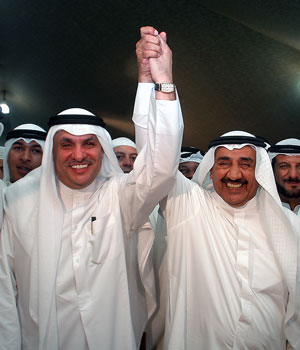
Outgoing parliament speaker Jassem al-Khorafi (R), a government ally, and opposition candidate Mohammad al-Saqer celebrate their victory in the Gulf emirate’s parliamentary elections early 30 June 2006 in Kuwait City (AFP)
KUWAIT CITY (AP) – Kuwaitis did not elect a single woman in their first elections open to both sexes, according to official results, but they did elect a parliament dominated by reformists that is expected to give the ruling family-appointed Cabinet a much tougher time.
“It was a loss lined with success,” said Fatima al-Abdali, one of the 27 women who ran against 222 men for the parliament’s 50 seats in Thursday’s elections.
Al-Abdali polled fifth in a field of 14 candidates in the constituency of Deyyah, a suburb of Kuwait City. She said it hurt to feel that women will never be regarded as equal to men in her conservative country, but she would not give up and planned to stand in the next elections, due in 2010. “With persistence, we will continue and we will get there,” said al-Abdali, a 48-year-old environmentalist.
The official scores of all contestants were not released Friday, but newspapers reported that the highest polling woman was Rola Dashti, a U.S.-educated economist, followed by Nabeela al-Anjari, a former Information Ministry official.
According to the list of winners published by the official Kuwait News Agency, no fewer than 36 of the incoming legislators have spoken in favor of electoral reform, the issue that led the emir to dissolve parliament last month and call the elections. In the last assembly 29 legislators endorsed electoral reform.
“This is proof that the people want change,” said Kuwait University political scientist, Abdul-Ridha Aseeri. “I believe the (new house) will be confrontational.”
Traditionally the emir does not take kindly to seeing Cabinet ministers being pushed too hard by the legislature. On three previous occasions the emir, who appoints the prime minister and approves the Cabinet, has dissolved the assembly after votes of no confidence or severe criticism of a minister. But Kuwaiti politics is likely to become rougher. Several lawmakers have said that the first order of business for the new parliament must be to pass a bill reducing the number of voting districts from 25 to five. They believe that fewer but much bigger constituencies would make it almost impossible for candidates to buy votes.
The outgoing Cabinet balked at such a drastic change in the delimitation of electoral districts, provoking a walkout in parliament that led to the dissolution.
Political analyst Sami al-Nisf warned that the next legislature and Cabinet would “need to show flexibility, good intentions and a real understanding of the events of summer 2006, or else the wagon of politics will slam into a wall.”
The newly elected reformists are mixed bunch, Muslim fundamentalists, liberals and independents. It is an open question how long their alliance will last because they are united on only one issue.
Aseeri described the alliance as “tactical rather than strategic,” saying its legislators disagree on virtually everything other than reducing the number of constituencies.
It is difficult to categorize the incoming legislators because there are no recognized political parties in Kuwait. Politicians form “movements” and may fit into more than one group. For example, an Islamist may enjoy tribal support, or vote with reformists depending on the issue.
The lawmakers known to be Islamists maintained their tally of 22 seats in the legislature. Liberals gained one seat to give them a total of four. The remaining 24 seats were won by independents or candidates associated with tribes.
No official figures on voter turnout have been released.

Kuwaitis wait for the results of the Gulf emirate’s parliamentary elections inside one of the campaign tents early 30 June 2006 in Kuwait City (AFP)

Kuwaiti parliamentary elections candidate Rula Dashti follows 30 June 2006 by telephone the results of Thursday’s vote (AFP)
